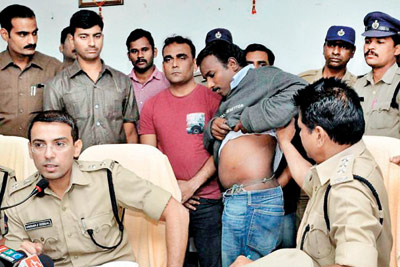News
Transplant inquiry stumbles over lack of detail

Kidney pic- the hindu (Superintendent of Police Vikram Jeet Duggal producing the accused in the kidney racket case before the media in Nalgonda— (File pic courtesy, The Hindu)
Sri Lanka’s claimed urgent action to investigate a kidney transplant racket alleged by media in India has run out of steam over a lack of concrete information and steadfast denials of culpability by hospitals and doctors.
The Health Ministry said January 22 that swift action was being taken to investigate the alleged racket. The ministry’s Director-General, Dr. Palitha Mahipala, told media that both the report of the five-member committee appointed that day and a police investigation would be finalised in three days so that further action could be taken.
The committee’s chief, Dr. Jayasundera Bandara, said it was not possible to deliver a report within the period expected as there was a “massive load of work” ahead and at least another week was needed.
Dr. Bandara said the committee started work only on Monday this week and was in the process of visiting the hospitals mentioned in the Indian media reports and scrutinising all documents pertaining to kidney transplants on foreign nationals in order to ascertain there were no irregularities.
Minister Dr. Rajitha Senaratne, when questioned by the media on the promised report, said the ministry could not produce “a mere piece of paper” and that an investigation was in progress.
Meanwhile the police Central Crime Division (CCD) which started its investigation only on Thursday is unable to proceed as it says it needs more information from the Ministry of Health.
ASP Ruwan Gunasekera said the police have nothing to go on.
The Health Ministry on January 23 gave Inspector-General of Police, N.K. Illangakoon, a letter requesting an investigation on the alleged kidney racket and information on whether there had been any criminal offence committed in connection with kidney transplants carried out for foreign nationals.
Dr. Mahipala admits the ministry began the investigation purely on the basis of the Indian media reports. Dr. Mahipala’s absence while currently overseas for an official meeting has delayed investigations further.
ASP Gunasekera said on completion of its investigation the CCD would decide on what action could be taken. “It can file a court case against the perpetrators or refer the case to the Attorney-General for action,” he said.
The Indian High Commission in Colombo through Press Attaché Esha Srivastava said it had “no comment” on the matter.
The five hospitals that have been mentioned in the media reports have halted all kidney surgeries on foreign nationals, heeding a government request.
A total of 29 applications requesting for kidney transplant from India, Bangladesh and Maldives have been kept on hold, Private Health Services Regulatory Council Director Dr. Kanthi Ariyaratne said.
Lanka Hospitals, Medical Superintendent Dr. Sunil Ratnapriya, said about five patients scheduled for transplant surgery last week had to be turned away. “Some of them were in critical condition but we had no choice,” he said.
He said that the hospital administration and the doctors concerned were happy that the accusations levelled at the industry were being investigated.
He said that at Hemas Hospitals surgery is carried out according to the Human Tissue Transplant Act and administrators had no wish to commit unlawful acts. “I hope that the investigation clears us. It will be good for the country and the industry,” Dr, Ratnapriya said.
Explaining the procedure, Dr Ratnapriya said patients who want transplants are all assessed by an Ethical Review Committee.
“Following an initial compatibility test to ascertain tissue matching of patient and donor a review is done by the hospital ethical committee and a Judicial Medical Officer gets an affidavit signed by a Justice of the Peace for the patient and donor to state that no money has exchanged hands,” he said.
In addition, the hospital also demands an affidavit from the patient’s home country, assuring that no money transaction has taken place in that country.
These documents, Dr. Ratnapriya said, are presented to the Health Ministry’s Private Hospital Section Development Director for scrutiny and sent to Dr. Mahipala’s office for approval.
Informed consent must be obtained from the donor stating that s/he is donating his tissue willingly and in a sound frame of mind.
Contrary to media reports that cases have been filed in the Indian courts against six Sri Lankan doctors, Dr. Ratnapriya claimed nothing has been heard of by the doctors or the hospitals. He said the doctors had not received any intimation from India to that effect.
The head of Medical Surgical Programmes at Hemas Hospitals, Dr. Panna Gunaratne, confirmed that there had been no word from India.
“We were not queried nor our doctors have got any intimation from the Indian courts or the police for the alleged kidney transplants,” he said.
He continued to say the issue was mere “media hype”. “There is no case against the doctors, not even a letter,” he asserted.
Dr. Gooneratne said Hemas Hospital did not perform “a single surgery” without ministry approval.
“The patients are all cleared by the Health Ministry before the transplants,” he said.
“The ministry’s Ethical Committee approves each transplant and everything is done in keeping with the Tissue Transplant Act of Sri Lanka,” he added.
The Government Medical Officers’ Association (GMOA) said its members have fared the worst over the issue.
Spokesman Dr. Naveen de Souza accused the government of acting solely on website reports and without any legal document or request from the Indian government.
If indeed any doctor in the GMOA was involved in a racket the Health Ministry should investigate and punish the culprits, he said.
Dr. Souza accused the Indian government of orchestrating the drama because of the GMOA’s protest against the CEPA services agreement and because India was concerned at money leaving that country as patients and donors came to Sri Lankan private hospitals for transplant surgeries.

